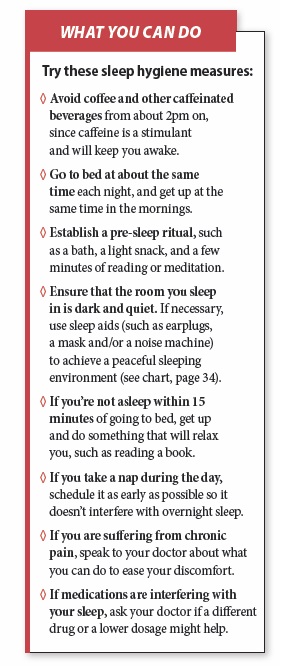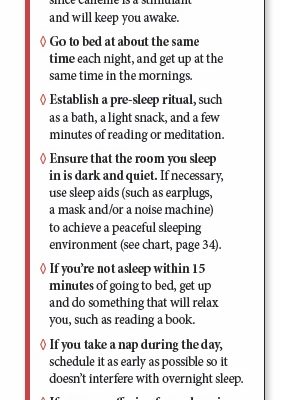“Sleep Hygiene” Can Help You Slumber Peacefully
Poor sleep predicts disability in older age, according to a recent study (Journal of the American Geriatrics Society, Sept. 14, 2016). Previous research has linked sleep problems to cardiovascular disease, heart attack and heart failure, high blood pressure, stroke, diabetes, obesity, depression, and cognitive issues. Daytime tiredness due to poor sleep also can make you susceptible to falls, with the attendant risk of fractures.
Older adults are at particular risk for poor sleep. Harrison Bloom, MD, associate clinical professor of geriatrics and palliative medicine at Mount Sinai, says that health issues such as arthritis often cause pain and discomfort that disturbs sleep as we age. “Wakefulness also may result from medications that are used to treat health issues,” he adds. “It’s common for older adults to feel sleepy during the day, due to poor slumber the night before, but to have difficulty getting to sleep once they’re in bed. Early waking also is a tendency.”
Unfortunately, previous research into the self-help methods seniors use to try to sleep better suggests that they frequently choose treatments that can potentially worsen their symptoms. There also is evidence that many older adults don’t consult their healthcare provider about their treatment choices. How can you ensure you sleep better while staying safe and healthy?
Poor Sleep and Disability The study we reference included 3,620 people aged up to 75, and analyzed survey data from 1995-1996 and 2004-2006. At both time points, 11 percent of the participants reported sleep problems. Those reporting sleep problems during the first survey were 55 percent more likely to experience limitations in their ability to complete activities of daily living (ADL), such as bathing, dressing, and walking one block, 10 years later. They were 28 percent more likely to have problems when it came to what are called “instrumental” activities of daily living (IADL)—for example, vacuuming, climbing stairs, and carrying groceries. Among participants who reported no disabilities during the first survey, those who had sleep problems were twice as likely to have problems with ADL 10 years later, and 70 percent more likely to have problems with IADL.
Dr. Bloom notes that lack of physical activity is associated with a greater risk for disability, and says it is possible that the chronic fatigue that can result from poor sleep may deter people from taking sufficient exercise. “The association between poor sleep and obesity also may be a factor, since obesity is linked with disability,” he adds. “Other conditions linked to poor sleep—such as cardiovascular disease, painful joints, and depression—also may play a role in the study findings.”
Self-Help Measures Aren’t Always Helpful In previous studies, seniors have reported engaging in a variety of approaches to try to improve their sleep. Commonly used interventions include reading, watching television, and listening to the radio. But Dr. Bloom says that in order to fall asleep quickly you need to condition yourself to “switch off” once you’re in bed. “If you use the bed for other pursuits, such as reading, you may not develop this conditioned response,” he points out.
Many older adults also use alcohol to help them drift off, but it’s a myth that alcohol helps you achieve restful sleep. While alcohol has a natural sedative effect that might help you go to sleep initially, it can exacerbate sleeplessness because it disturbs the balance between REM sleep (lighter sleep that includes dreaming) and non-REM sleep (deep sleep), preventing the brain from performing the normal restorative job it does overnight. “Alcohol also interacts with many medications older adults take,” Dr. Bloom says. “Alcohol and drugs can be a risky combination that affects balance, putting you at risk for falls.”

Sleep Medications Should be a Short-Term Solution While sleep medications can be useful to break a pattern of poor sleeping when all else fails, they come with their own potential problems. “In older adults, sleeping pills can cause daytime drowsiness and impair memory, and they’re also associated with falls,” Dr. Bloom confirms.
A 2015 study suggested that older adults are prone to using over-the-counter sleep medications for 15 days or more per month, which is considered to be indicative of inappropriate use. “Sleep medications can be a useful short-term measure, with the emphasis on short-term,” says Dr. Bloom. “However, they are not intended for chronic use, and their safety and efficacy has not been well studied in older adults.” Dr. Bloom points to simple sleep hygiene as a solution that could make a difference to your sleep quality without you having to rely on drugs—see What You Can Do for more.
Seek Medical Advice if You Have Sleep Apnea Symptoms Snoring or gasping during sleep, or feeling excessively tired despite apparently sleeping well, can be signs of a condition called sleep apnea. You’re more at risk for this if you’re overweight. If you’re suffering these symptoms your doctor may recommend you attend a sleep disorders clinic for follow-up.
The post “Sleep Hygiene” Can Help You Slumber Peacefully appeared first on University Health News.
Read Original Article: “Sleep Hygiene” Can Help You Slumber Peacefully »


